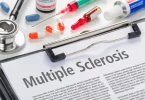A young woman wakes up one morning to find she’s suddenly gone deaf. A middle-aged man hears a pop in his left ear, which then stops working altogether. A person begins, without warning, suffering from tinnitus, which quickly progresses into total hearing loss.
All three of these individuals are suffering from the same condition — an ear stroke, also known as sudden sensorineural hearing loss (SSHL).
What Is an Ear Stroke?

An ear stroke occurs when an individual experiences rapid-onset, severe hearing loss. This may be partial or complete, and although it’s usually isolated to one ear, it can affect both. The hearing loss is generally temporary, and around half of the people suffering from SSHL often recover their hearing over the course of a week or two.
As with many hearing-related problems, SSHL usually occurs later in life, around 40-60 years of age, but can (and often does) occur in younger individuals. And as you might expect, given the name, an ear stroke isn’t something you should ignore. Even if there is a chance you’ll recover, it’s still imperative that you seek treatment the moment you suspect you’ve developed the condition.
Symptoms of an ear stroke include:
- Tinnitus
- A feeling of “fullness” in the ear
- Unexplained balance issues
- Sudden, often unexplained hearing impairment
- A loud popping sound followed by loss of functionality
What Causes Ear Strokes?
Unfortunately, the short answer is that we don’t know. In the vast majority of cases, there is no identifiable cause. The issue is that there’s actually a massive list of potential causes for SSHL, including infections, trauma, diseases, a bad reaction to drugs, and chronic illnesses/disorders.
To make matters worse, SSHL is often incorrectly attributed to a less severe cause, such as a blockage of the ear canal or an allergic reaction. Again, though, if you’ve any reason to even suspect you may be suffering from SSHL, you need to visit a doctor immediately. The sooner you receive treatment, the better your chances of recovery.
How Are Ear Strokes Treated?
Generally, unless the root cause of SSHL can be properly identified, the most common treatment involves anti-inflammatory steroid medication. This can either be offered in pill form or injected directly into the ear. They are often pre-emptively prescribed before a patient’s test results come back. Depending on the results, the patient may either continue their steroid treatments or switch to an alternative.
In some scenarios, effective treatment may not be possible. Often, this may result from the patient waiting too long before an examination, but it also depends mainly on the underlying cause. In these cases, hearing aids or cochlear implants may be the only option.
Final Thoughts
At the end of the day, although the cause of ear strokes remains a mystery, they’re usually treatable if caught early enough. Pay careful attention to your hearing, and don’t hesitate to contact an ear, nose, and throat (ENT) specialist if something seems amiss. With something as critical as hearing, it’s always better to be safe than sorry.
About the Author:
Dr. Renee Flanagan is the Director of Audiological Care at Hearing Planet. She works with the training and development of Hearing Care staff so they may help the hearing impaired population by following best in class hearing healthcare practices.








